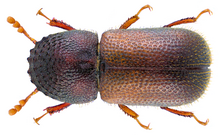Bostrichidae
| Bostrichidae Temporal range: | |
|---|---|

| |
| Euderia squamosa | |
| Scientific classification | |
| Domain: | Eukaryota |
| Kingdom: | Animalia |
| Phylum: | Arthropoda |
| Class: | Insecta |
| Order: | Coleoptera |
| Suborder: | Polyphaga |
| Infraorder: | Bostrichiformia |
| Superfamily: | Bostrichoidea |
| Family: | Bostrichidae Latreille, 1802 |
| Subfamilies | |
| Diversity | |
| About 700 species | |
The Bostrichidae are a family of beetles with more than 700 described species. They are commonly called auger beetles, false powderpost beetles, or horned powderpost beetles. The head of most auger beetles cannot be seen from above, as it is downwardly directed and hidden by the thorax. Exceptions are the powderpost beetles (subfamily Lyctinae), and members of the subfamily Psoinae.

Bostrychoplites cornutus has large, distinctive thoracic horns, and is found in parts of Africa and Arabia; it is often imported to Europe as larvae in African wooden bowls ("ethnic souvenirs") .[1]
The fossil record of the family extends to the Cretaceous, with the oldest records being from the Cenomanian aged Charentese and Burmese ambers, belonging to the extant genus Stephanopachys[2] and the extant subfamilies Dinoderinae[3] and Polycaoninae.[4]
Selected species
This list is incomplete:[5]
- Amphicerus cornutus (Pallas, 1772)
- Apate terebrans (Pallas, 1772)
- Lichenophanes bicornis (Weber, 1801)
- Prostephanus truncatus (Horn, 1878)
- Xylobiops basilaris (Say, 1824)
- Species found in Australia
- Dinoderus minutus (Fabricius)
- Lyctus brunneus (Stephens)
- Lyctus discedens Blackburn
- Lyctus parallelocollis Blackburn
- Mesoxylion collaris (Erichson)
- Mesoxylion cylindricus (Macleay)
- Minthea rugicollis (Walker)
- Rhyzopertha dominica (Fabricius) - lesser grain borer
- Sinoxylon anale (Lesne)
- Xylion cylindricus Macleay
- Xylobosca bispinosa (Macleay)
- Xylodeleis obsipa Germar
- Xylopsocus gibbicollis (Macleay)
- Xylothrips religiosus (Boisduval)
- Xylotillus lindi (Blackburn)
- Species found in the United Kingdom
- Bostrichus capucinus
- Bostrychoplites cornutus (Olivier, 1790)
- Lyctus cavicollis
- Lyctus linearis (Goeze, 1877)
- Lyctus planicollis
- Lyctus sinensis
- Stephanopachys substriatus
- Trogoxylon parallelopipedum

- Fossil species
- †Discoclavata dominicana Poinar Jr., 2013[6]
References
- ^ Walker, Ken (2006-11-23). "Auger beetle Bostrychoplites cornutus (Olivier) (Coleoptera: Bostrichidae: Bostrichinae)". Pest and Diseases Image Library. Archived from the original on 2007-09-09.
- ^ Delclòs, Xavier; Soriano, Carmen; Perrichot, Vincent (2014-03-31). "The earliest occurrence and remarkable stasis of the family Bostrichidae (Coleoptera: Polyphaga) in Cretaceous Charentes amber". Palaeontologia Electronica. 17 (1): 1–8. doi:10.26879/408. hdl:2445/120503. ISSN 1094-8074.
- ^ Legalov, Andrei A. (December 2018). "New auger beetle (Coleoptera; Bostrichidae) from mid-Cretaceous Burmese amber". Cretaceous Research. 92: 210–213. Bibcode:2018CrRes..92..210L. doi:10.1016/j.cretres.2018.08.014. ISSN 0195-6671. S2CID 133930742.
- ^ Legalov, Andrei A.; Háva, Jiří (December 2020). "The first record of subfamily Polycaoninae (Coleoptera; Bostrichidae) from mid-Cretaceous Burmese amber". Cretaceous Research. 116: 104620. Bibcode:2020CrRes.11604620L. doi:10.1016/j.cretres.2020.104620. ISSN 0195-6671. S2CID 224965515.
- ^ "Bostrichidae". CSIRO. 2004-11-11.
- ^ Poinar Jr, George (2013). "Discoclavata dominicana n. gen., n. sp., (Coleoptera: Bostrichidae) and Lissantauga epicrana n. gen., n. sp. (Coleoptera: Ecumenidae) in Dominican amber". Historical Biology: An International Journal of Paleobiology. 25 (1): 107–113. Bibcode:2013HBio...25..107P. doi:10.1080/08912963.2012.712518. S2CID 86040146.
Bibliography
- Borowski, Jerzy; Węgrzynowicz, Piotr (2012). The Powderpost Beetles of the World (Coleoptera: Bostrichidae): Keys for the Identification of Species, Volume 1. Mantis. ISBN 9788362860036.
External links
- Lucid Fact Sheet
- Heterobostrychus aequalis, an oriental wood borer on the UF / IFAS Featured Creatures Web site
- Lyctus planicollis, southern lyctus beetle on the UF / IFAS Featured Creatures Web site
- Xylopsocus capucinus, a false powderpost beetle on the UF / IFAS Featured Creatures Web site
